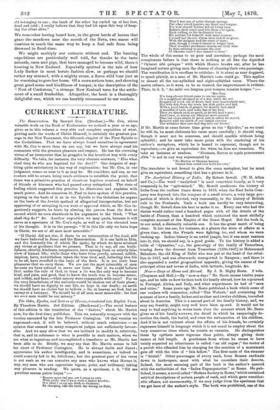The Odes, Epodes, and Satires of Horace, translated into English
Verse. By Theodore Martin. 3rd Edition. (Blackwood.)—The novel feature of this edition is the translation of the "Satires," which Mr. Martin now, for the first time, publishes. This we naturally compare with the version executed by the late Professor Conington. Of that version we expressed—not, it will be believed, without much reluctance — an opinion that seemed to many competent judges not sufficiently favour- able. And we may allow that we are inclined to modify it, relatively, that is, and in reference to what is possible in such matters, when we see what so ingenious and accomplished a translator as Mr. Martin has been able to do. Briefly, we may say that Mr. Martin seems to fall far short of Professor Conington. He is always facile and fluent ; appreciates his author intelligently, and is sometimes, as indeed he could scarcely fail to be, felicitous ; but the greatest part of his verse is not such as we can conceive any man who knows what Horace is, nay, any man who can appreciate vigour, point, and brilliancy, taking any pleasure in reading. We quote, as a specimen, i. 6, "Nil me pceniteat gamma patris hnjus ":—
" Beason must fail me, ere I cease to own
With pride, that I have such a father known ; Nor shall I stoop my birth to vindicate, By charging, like the herd, the wrong on Fate, That I was not of noble lineage sprung: Far other creed inspires my heart and tongue : For now should Nature bid all living men Retrace their years and live them o'er again, Each culling, as his inclination tent, His parents for himself, with mine content, I would not choose, whom men endow as great, With the insignia and the seats of state ; And, though I seemed insane to vulgar eyes, Thou woulds't perchance esteem me truly wise In thus refusing to assume the care Of irksome state I was unused to bear."
The whole of this seems to us poor and nerveless ; perhaps the most conspicuous failure is that there is nothing at all like the dignified " Optaret sibi quisque " with which Horace breaks out, after he has imagined nature giving men the chance of choosing their own parentage. The versification it is needless to criticize ; it is about as near doggerel, to speak plainly, as a man of Mr. Martin's taste could go. This applies to almost all the ten-syllabled and eight-syllabled verse. Where the metre refuses, as it were, to be so treated, the improvement is evident. Thus, in ii. 2, "Ac mihi seu longum post temps venerat hospes ":- "But then, If a long-absent friend came to see me again,
Or a neighbour dropped in of a day, when the wet
Stopped all work out of doors, they were handsomely met,
Not with fish from the town, but with pullet and kid, With a good bunch of grapes for dessert, laid amid A handful of nuts, and some figs of the best.
Then we drank each as much as he felt had a zest ; And Ceres, to whom our libations were poured, That our crops might be good, and in safety be stored, Relaxed with the mirth of our simple carouse The wrinkles that care had dug into our brows."
If Mr. Martin at some future time gives us the "Epistles," as we trust he will do, he must elaborate his verse more carefully ; it should ring, though it must not be sonorous, and should sparkle without being splendid ; and he must take more pains with the rendering of his author's metaphors, which he is bound to represent, though not to reproduce,—to give an equivalent for, when he does not translate. We take an instance at random. " Sisennas, BalT08 ut equis pra3curreret albis " is not in any way represented by
"No Barrus or Sisenna known Vainst him could ever hold his own."
The translator is not bound to give the same metaphor, but he must give an equivalent, something that has a picture in it.






























 Previous page
Previous page